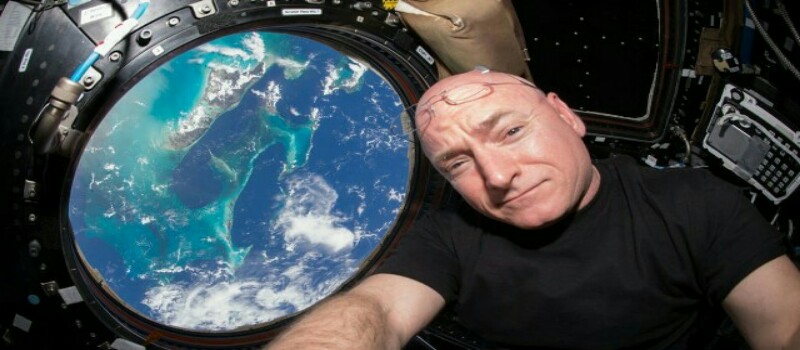
Weird things that happen to your body
if you live in space for a year
In the name of science, former NASA astronaut Scott Kelly shoved himself into the top of a rocket, accelerated to 17,500 mph, and fell around Earth for 340 days — nearly an entire year.
The lack of gravity, radiation exposure, Kelly's diet, and other facts of life in orbit affected his body in significant ways — including, as NASA is learning now, even perhaps his genetic blueprint.
The Twin Study, which is still in progress, uses Scott Kelly's identical twin brother and fellow former astronaut, Mark Kelly, to unmask the subtle but important effects of long-duration space travel on the human body.
Here are some biological oddities that researchers have found happen to your body if you're in space for a year.
Your face looks different. Your body liquid spreads out more evenly, so your face looks way more puffy.
Your bone density can change. If you don’t exercise you can lose approximately 12% of your bone density.
Your body fluids shift. The fluid shifting from your legs to your head could fill a 2 liter bottle.
Your sight could change. Your vision could get worse due to pressure changes in the brain.
Your muscles can atrophy. You don’t need muscles when you’re weightless, so they shrink and absorb the extra tissue.
You'll be sleepy. You’ll probably be sleep-deprived. Most astronauts struggle to get a good night’s rest because sleeping in space is ackward.
Your cancer risk increases. Radiation bombarding your body outside of Earth’s protective magnetic field can increase your chances of getting cancer.
You get taller — until you get back to Earth. Since gravity isn’t pushing you down, your spine stretches and you can grow approximately 3% taller.
The lack of gravity, radiation exposure, Kelly's diet, and other facts of life in orbit affected his body in significant ways — including, as NASA is learning now, even perhaps his genetic blueprint.
The Twin Study, which is still in progress, uses Scott Kelly's identical twin brother and fellow former astronaut, Mark Kelly, to unmask the subtle but important effects of long-duration space travel on the human body.
Here are some biological oddities that researchers have found happen to your body if you're in space for a year.
Your face looks different. Your body liquid spreads out more evenly, so your face looks way more puffy.
Your bone density can change. If you don’t exercise you can lose approximately 12% of your bone density.
Your body fluids shift. The fluid shifting from your legs to your head could fill a 2 liter bottle.
Your sight could change. Your vision could get worse due to pressure changes in the brain.
Your muscles can atrophy. You don’t need muscles when you’re weightless, so they shrink and absorb the extra tissue.
You'll be sleepy. You’ll probably be sleep-deprived. Most astronauts struggle to get a good night’s rest because sleeping in space is ackward.
Your cancer risk increases. Radiation bombarding your body outside of Earth’s protective magnetic field can increase your chances of getting cancer.
You get taller — until you get back to Earth. Since gravity isn’t pushing you down, your spine stretches and you can grow approximately 3% taller.





